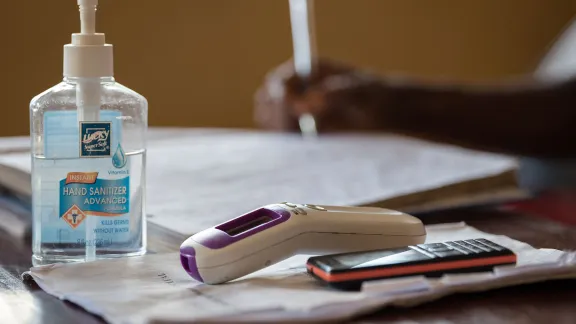
Churches have structures in place and contact to communities that are a great asset in containing the spread of COVID-19. Photo: LWF/Albin Hillert
Support seeks to be sign of hope and solidarity within global Lutheran communion
(LWI) - The Lutheran World Federation (LWF) has launched a Rapid Response Fund to help member churches struggling with unprecedented challenges posed by the Coronavirus disease (COVID-19) pandemic.
In a letter sent to all 148 members of the global communion, LWF General Secretary Rev. Dr Martin Junge notes that many churches live and work as front-line responders in a context that is particularly vulnerable to such emergencies. This work includes pastoral care and counselling to the fearful, the sick and the dying, as well as medical care, livelihoods support and similar practical actions.
At the same time, the letter says, “churches can play an important role in countering stigma resulting from the pandemic, and in advocating towards duty bearers to deliver adequate social services to affected communities. In doing so, church staff are particularly vulnerable to the virus themselves by serving people in need through holistic mission.”
Messages of hope and solidarity
During this exceptional time, Junge says, “churches are called to continue offering their vibrant witness while participating in God’s holistic mission by sharing messages of hope and solidarity, by providing diaconal services, and by advocating for adequate response to the pandemic and support to the population.”
While some member churches are able to access grants to help them cope with the current crisis, explains Marina Doelker, LWF’s Program Executive for Diakonia and Development, “the new Rapid Response Fund aims to particularly support those churches that may not be able to find other sources of funding.”
The amount of money available through applications to the fund may be comparatively small, Doelker continues, “but it sends a strong message of hope and represents a tangible sign of solidarity between churches in communion.”
Ensure no one is left behind
Member churches are invited to submit applications and the LWF Communion Office in Geneva will manage the screening and approval process of all grants, based on its “deep knowledge and close connectedness with churches in the different regions.” Applicants must provide details of liturgical, diaconal or advocacy activities that address “unforeseen and urgent needs resulting from the COVID -19 pandemic.”
The goal of the new fund is to ensure that “no one is left behind” in this time of uncertainty for the future, Junge says in his letter to all church leaders. “As churches in communion, we come together through the Communion Office, standing together in times of trial, and supporting each other in faithful witness to our Lord Jesus Christ,” he adds.
The LWF is looking to raise at least half a million EUR for the Rapid Response Fund. "I’m encouraged by great interest and support shown by member churches and related agencies, whom we have invited to partner with the LWF in this vital response," concludes the LWF General Secretary.


